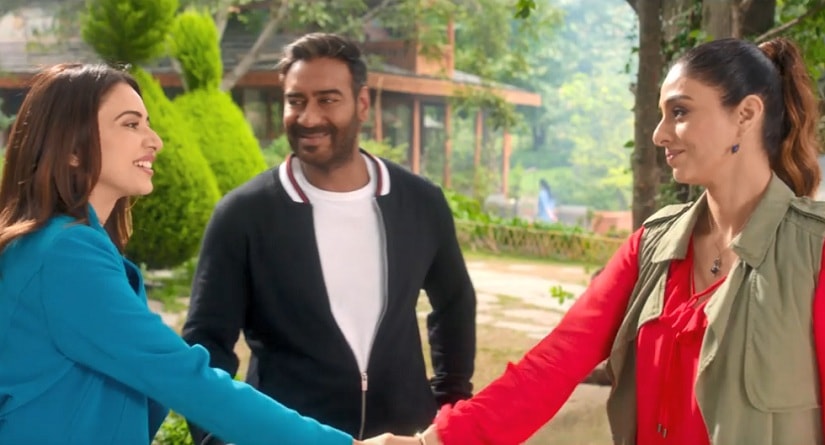In the opening scene of De De Pyaar De (Give Me Love), a man throws a bachelor party for a friend. Enter: a stripper. Just as she is giving the groom a lap dance, enter: the bride. “Which man in the world will turn down a stripper at his own bachelor party?” says more than one character in defence of the fellow when the angry woman confronts him. He is projected as a hapless chap following his natural instincts, she as a humourless, unreasonable, screeching banshee.
The stripper gets drunk and ends up spending the night at the host’s house. When she wakes up, she assumes something had happened between them and ribs the man gently about it. She is convinced of her hotness, sounds comfortable with the thought that he might have had sex with her when she was passed out and will not believe it when he says he did nothing. “Main behoshi ke bahaane ka mauka nahin deta,” the man explains. “Bahaana” in Hindi can be read as both “pretence” and “excuse”, so that translates to: “I do not give women the opportunity to cry rape using the pretence of having been unconscious as their excuse.”
Later in the same passage, she dispenses this wisdom about infidelity: you do not fall in love after one sexual encounter, so how can one sexual encounter cause you to fall out of love? In the context in which that sentence is uttered (that is, while discussing a woman not trusting the man she supposedly loves), here is a translation: a woman does not fall in love with a man simply because she had sex with him once, so how can she fall out of love with that man simply because he had sex with another woman just once?
The line is repeated later in the film by another character.
It’s that same old argument from the 1981 Jeetendra-Rekha-Shabana Azmi-starrer Ek Hi Bhool, in which a wife is taunted and demonised for not forgiving her husband’s single act of sexual infidelity because, after all, it was — as even the erring spouse has the audacity to tell her while demanding absolution — “ek hi bhool” (just one mistake).
Director-editor Akiv Ali’s De De Pyaar De has been marketed as an older-man-younger-woman romance, but make no mistake about this: what it truly is is a vehicle for claims of universal male victimhood, better disguised than its co-producer and co-writer Luv Ranjan’s three directorial ventures that have struck box office gold in the past decade — Pyaar Ka Punchnama, Pyaar Ka Punchnama (PKP) 2 and Sonu Ke Titu Ki Sweety (SKTKS). Just to make it clear that De De Pyaar De is a tribute to Ranjan’s earlier works, it features a cameo by Sunny Singh from PKP 2 and SKTKS. The only thing missing is the song from the PKPs: “Bandh gaya patta, dekho bann gaya kutta” (The leash has been tied / Look, he’s become a dog).
Unlike those three films, the stars of De De Pyaar De are big names, and perhaps because of that the misogyny is less crass and cleverly packaged instead as a call to modernity, couched in humour, wrapped in the combined warmth of Tabu, Ajay Devgn and their relatively lesser known but equally charismatic co-star Rakul Preet Singh. I kid you not, when a man cheats in this film it is described as an act of generosity towards a woman in need. His advocate is so eloquent while batting for him, that I almost wanted to give him a Nobel Peace Prize for Sexual Kindness.
The story, as you already know from the promotions, is centred around Ashish (Ajay Devgn) and Aisha (Rakul Preet Singh), who fall in love despite the quarter-century age gap between them. Ashish is a wealthy businessman living in London and estranged from his wife Manju (Tabu), who is a hotelier in Kullu and has brought up their two children. Aisha works through the corporate grind during the week and is a bartender on weekends.
The first half of De De Pyaar De is devoted to Ashish and Aisha overcoming their own mental blocks against their relationship. Post interval, they travel to India to introduce her to his family. Confusion and misunderstandings follow, but inevitably, there is reconciliation. How that reconciliation is reached or what it amounts to is what the trailer does not reveal.
Despite the troubling set-up with the bachelor party scene, what follows between Ashish and Aisha is sweet and I found myself wondering if the opening chapter was just an aside, possibly the director’s bow to his mentor’s persecution complex about men. Big mistake.
That said, it makes for such a pleasant change to see a male superstar of Devgn’s generation playing his real-life age instead of a 20/30-something screen character. He and Singh have genuine chemistry between them (although he should perhaps be officially banned from kissing women on screen since he seems to go cold in such scenes).
He of course is a talent familiar to Hindi film-goers. The very attractive Singh’s decade-long filmography, however, is dominated by Tamil and Telugu cinema and she has done very little work in Bollywood so far. She is good, so the loss is yours, Bollywood.
When the action shifts to Kullu, it begins to feel a bit confusing that Ashish and Aisha’s age difference is an issue in the eyes of their family, when a viewing of Hindi cinema for the past four decades would have convinced a foreigner that a 15-20 year age difference is routine in Indian man-woman relationships. Male stars of Bollywood — from Amitabh Bachchan onwards in particular — have, after all, courted younger and younger heroines as they have grown older and their stature has risen.
De De Pyaar De‘s sense of humour continues in the second half, but the misogyny too is now front and centre. It peaks in a horrid competitive scene between Aisha and Manju in which Aisha makes nasty ageist comments using a “puraani gaadi” (old car) as a metaphor for an ageing woman. It is worth noting that when she speaks of Ashish’s age early on, it is written as fond teasing, when she speaks of Manju’s age, she is downright mean.
Tabu, of course, is luminous, and when she is around, she overshadows everyone else, including the gifted leads. It hurts though that she agreed to be part of this disturbing film in which her warmth makes an odd bedfellow with the animosity towards women underlying the entire screenplay and a weird twist in the end that is supposed to be cool but is too terribly contrived to be convincing.
She also gets to deliver the message that is obviously the primary purpose of De De Pyaar De‘s existence: “We need to stop blaming him for everything.” In the scene in which Manju makes this statement, “him” is Ashish, but we were not born yesterday, so yeah we get it, “him” is all bechare men being blamed unfairly for all the wrongs in the world for which women should take equal blame, most especially when it is ek hi bhool. Haiye. Poor things.
On second thoughts, the flippant tone of that last paragraph does not sufficiently convey the sadness I felt as a woman watching a film on male victimhood with Alok Nath in the cast. Context cannot be ignored in the matter of casting, and in this case, the specific link between the actor and the theme of De De Pyaar De makes it impossible to separate the art from the artist. This is the same Alok Nath who has multiple allegations of sexual harassment and violence against him, and whose first reaction to a rape charge by a TV stalwart last year was to casually say, “Neither am I denying this nor do I would (sic) agree with it” and “It is useless to react on the allegations as in today’s world only what a woman says will be considered.”
I am not delving into the timeline of De De Pyaar De‘s casting and production, because Nath plays a small supporting character who could have been ousted if the producers (Ranjan’s Luv Films and T-Series — undoubtedly a moneyed lot) had the will to do so, whereas Hollywood icon Kevin Spacey was House of Cards‘ leading man yet was dropped following multiple sexual abuse charges against him and Ridley Scott re-shot a film to replace Spacey for the same reason. Of course it is worth remembering, as the US magazine The Atlantic noted in October 2018, that most “men of #MeToo” in the American entertainment industry have been or are being gradually welcomed back after a brief exile. And in a film industry not far from Bollywood, Malayalam megastar Dileep — who was chargesheeted in a 2017 rape case — played a character in Kammara Sambhavam who got to mouth a line about false cases of sexual violence.
So yeah, Alok Nath is in a film about male victimhood, fronted by personages no less than Tabu and Ajay Devgn. In your face, women!



Leave a Reply